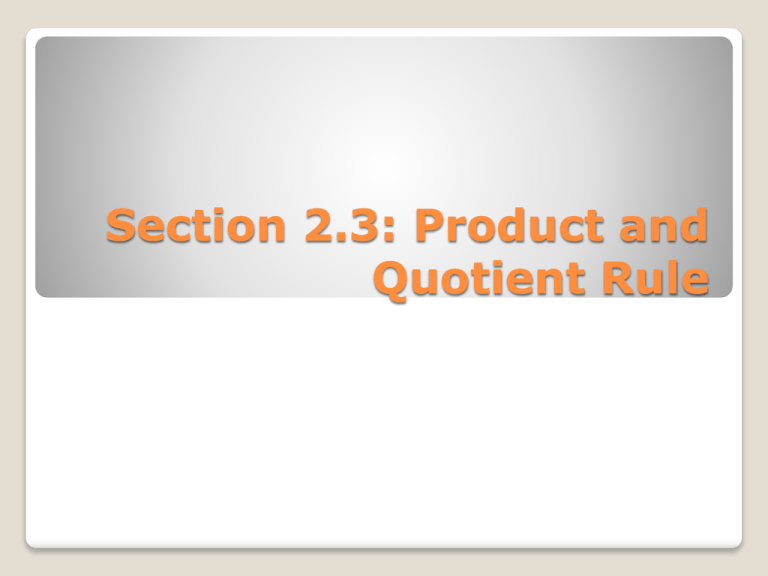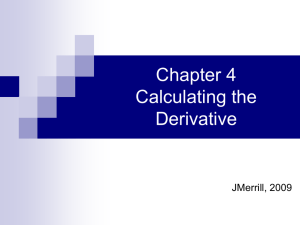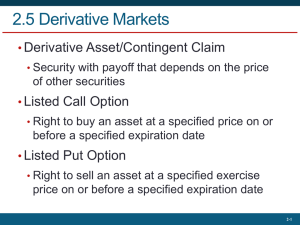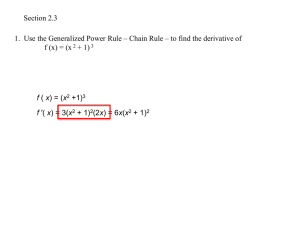Product and Quotient Rule
advertisement

Section 2.3: Product and Quotient Rule Objective: Students will be able to use the product and quotient rule to take the derivative of differentiable equations Review: Definition of Derivative The derivative of f at x is given by f ( x x) f ( x) f ( x) xlim 0 x Provided the limit exists. For all x for which this limit exists, f’ is a function of x. Product Rule Theorem 2.7:The product of two differentiable function f and g is itself differentiable. Moreover, the derivative of fg is the first function times the derivative of the second , plus the second function times the derivative of the first. d f ( x) g ( x) f ( x) g ( x) g ( x) f ( x) dx You can reverse the order in which you take the derivative of the terms in the product rule. Example #1 (5x 4 x )(6 2 x) 2 Step 1: (5 x 4 x 2 ) d d [6 2 x] (6 2 x) [5 x 4 x 2 ] dx dx (derivative of the second term)(first term)+(derivative of the first term)(second term) Step 2: [(5x 4x )(2)] [(6 2x)(5 8x)] 2 -Take derivative Step 3: 10x 8x 2 30 48x 10x 16x 2 -Simplify Step 4: 24x 28x 30 2 -Simplify Example #2 x (5x 2x) 2 Step 1: x (10x 2) (5x 2x)(.5x 2 (1/ 2) -Take derivative Step 2: 10x ( 3 / 2) 2 x (5 / 2) x -Simplify Step 3: 12.5x (3 / 2) 3x -Simplify (1/ 2 ) ( 3 / 2) x (1/ 2) ) Example #3 ( x 3x 1)(3x 2) 3 Find the tangent line at point (-2,1) using the above equation Step 1: [(x3 3x 1)(3)] [(3x 2 3)(3x 2)] -Take derivative Step 2: Step 3: Step 4: Step 5: 3x3 9 x-Simplify 3 9 x3 6 x 2 9 x 6 12x3 6 x 2 18x 3 -Simplify -plug in x=-2 from the point 12(2)3 6(2)2 18(2) 3 (-2,1) to get the slope of the 96 24 36 3 39 tangent line -Simplify Step 6: y 1 39( x 2) -Plug slope & point into the point slope equation Quotient Rule Theorem 2.8:The quotient f/g of two differentiable functions f and g is itself differentiable at all values of x for which g(x)≠ 0. Moreover, the derivative of f/g is given by the denominator times the derivative of the numerator minus the numerator times the derivative of the denominator, all divided by the square of the denominator. d f ( x) g ( x) f ( x) f ( x) g ( x) , 2 dx g ( x) g ( x) g ( x) 0 You can not reverse the order in which you take the derivative of the terms in the quotient rule. Example #1 4x 2 y 2 x 6 d d 2 ( x 6) [4 x 2] (4 x 2) [ x 6] d 4x 2 dx dx [ 2 ] dx x 6 ( x 2 6) 2 2 Step 1: (derivative of the top term)(bottom term)-(derivative of the bottom term)(top term) (bottom term)2 Step 2: Step 3: [(x 2 6)(4)] [(4 x 2)(2 x)] ( x 2 6) 2 4 x 2 4 x 24 x 4 12x 2 36 -Simplify -Take derivative Example #2 5 (1 / x ) y x3 7 Step 1: x[5 (1 / x)] -Get rid of fraction in the numerator by x( x 3 7) multiply the numerator and denominator by x Step 2: 5x 1 x4 7x Step 3: Step 4: -Simplify ( x 4 7 x)(5) (5x 1)(4 x 3 7) ( x 4 7 x) 2 15x 4 4 x 3 7 x 8 35x 5 49x 2 -Simplify -Take derivative Example #3 x2 6 y 4 x 8 Find tangent equation at point (-1,3) Step 1: 2 x( x 4 8) 4 x 3 ( x 2 6) -Take derivative ( x 4 8) 2 Step 2: 2 x 5 16x 4 x 5 24x 3 -Simplify x 8 16x 64 Step 3: Step 4: 2 x 5 24x 3 16x x 8 16x 4 64 -Simplify 2(1)5 24(1)3 16(1) 10 -plug in x=1 from the 8 4 (1) 16(1) 64 81 point (-1,3) to find the slope of the tangent line Step 5: y 3 10 ( x 1) -plug the slope and point into the point 81 slope formula Combining the Product Rule & Quotient Rule *For this type of problem use the quotient rule and with in the quotient rule use the product rule to take the derivative of the numerator Product rule for (3 x 2)(4 x 2 8) derivative of the x9 numerator 2 2 Step 1: 3(4 x 8) 8 x(3x 2)( x 9) (1)(3x 2)(4 x 8) ( x 9) 2 -Take derivative 2 2 3 2 Step 2: (12x 24 24x 16x)(x 9) 12x 24x 8 x 16 x 2 18x 81 -Simplify 3 3 2 2 2 3 2 Step 3: 12x 24x 24x 16x 108x 216 216x 144x 12x 24x 8 x 16 x 2 18x 81 -Simplify 3 2 Step 4: 24x 332x 144x 200 x 2 18x 81 -Simplify









